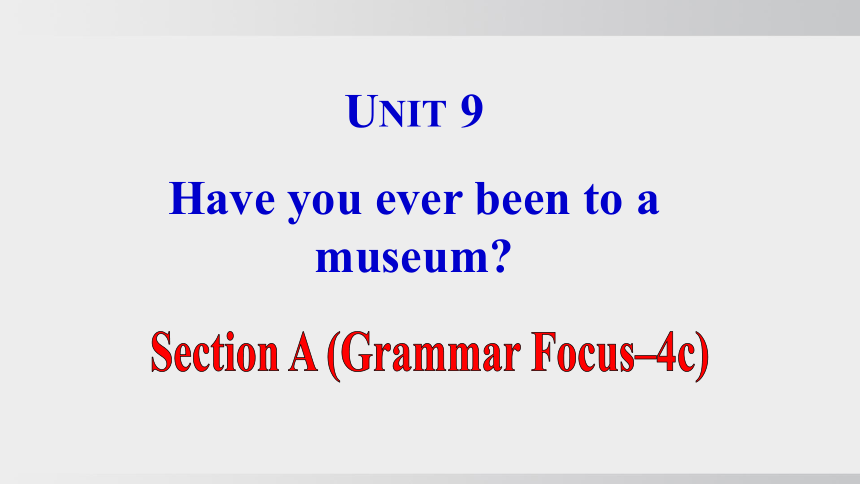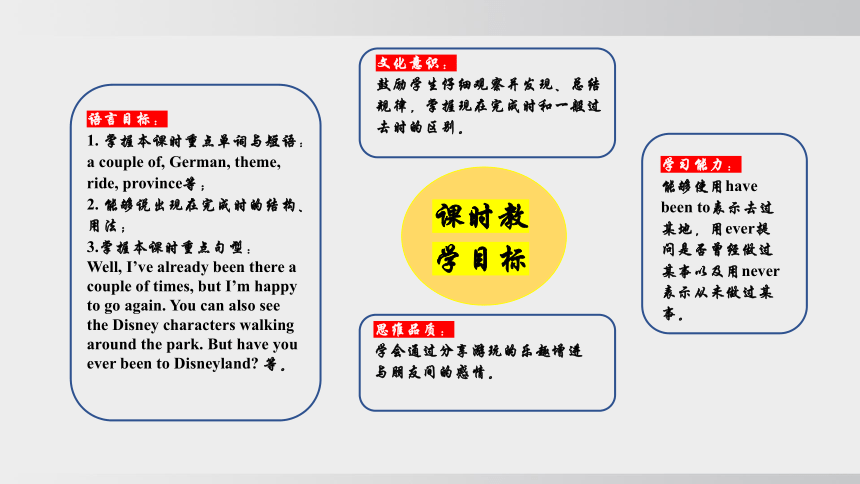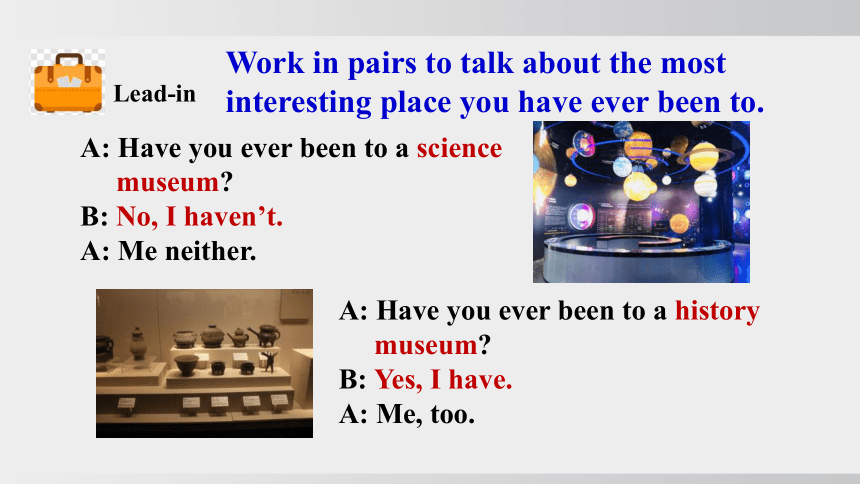八年级英语下册课件Unit 9 Have you ever been to a museum Section A (Grammar Focus–4c)(共11张PPT)
文档属性
| 名称 | 八年级英语下册课件Unit 9 Have you ever been to a museum Section A (Grammar Focus–4c)(共11张PPT) |  | |
| 格式 | pptx | ||
| 文件大小 | 1.2MB | ||
| 资源类型 | 教案 | ||
| 版本资源 | 人教新目标(Go for it)版 | ||
| 科目 | 英语 | ||
| 更新时间 | 2025-02-07 09:25:20 | ||
图片预览





文档简介
(共11张PPT)
Unit 9
Have you ever been to a museum
Section A (Grammar Focus–4c)
语言目标:
1. 掌握本课时重点单词与短语:a couple of, German, theme, ride, province等;
2. 能够说出现在完成时的结构、用法;
3.掌握本课时重点句型:
Well, I’ve already been there a couple of times, but I’m happy to go again. You can also see the Disney characters walking around the park. But have you ever been to Disneyland 等。
学习能力:
能够使用have been to表示去过某地,用ever提问是否曾经做过某事以及用never表示从未做过某事。
课时教
学目标
思维品质:
学会通过分享游玩的乐趣增进与朋友间的感情。
文化意识:
鼓励学生仔细观察并发现、总结规律,掌握现在完成时和一般过去时的区别。
Lead-in
Work in pairs to talk about the most interesting place you have ever been to.
A: Have you ever been to a history
museum
B: Yes, I have.
A: Me, too.
A: Have you ever been to a science
museum
B: No, I haven’t.
A: Me neither.
Lead-in
Have you ever been to Disneyland
上海迪士尼乐园( Shanghai Disney Resort)是中国内地首座迪士尼主题乐园( theme park),位于上海市浦东新区川沙新镇,于2016年6月16日正式开园。它是中国大陆第一个、亚洲第三个、世界第六个迪士尼主题公园。
乐园拥有七大主题园区:米奇大街、
奇想花园、探险岛、宝藏湾、明日
世界、梦幻世界、玩具总动园;两座
主题酒店:上海迪士尼乐园酒店、玩
具总动员酒店;一座地铁站:迪士尼站;
并有许多全球首发游乐项目。
Grammar Focus
Have you ever been to a science museum Yes, I’ve been to a science museum./ No, I’ve never been to a science museum.
Have you ever visited the space museum Yes, I have. I went there last year. / No, I haven’t.
I’ve been to the art museum many times. Me, too. And I’ve also visited the nature museum.
I’ve never been to a water park. Me neither.
Grammar Focus
have been to 表示 “ 曾经去过某地(去了又回来了)”,即 “ 去而复返 ”。
have/has ever been to 表示 “ 曾去过某地 ”,用在肯定句或疑问句中,ever 表示 “ 曾经 ”,位于 have/has 后,过去分词前;have/ has never been to 表示 “ 从没有去过某地 ”,表否定意义,never 表示 “ 从不;从未 ”,位于助动词 have/has 后,过去分词前。
have gone to 表示“到某地去了”,在路途中或已经到达目的地,即“去而未返”。
have been in/at 表示“在某地已经多长时间了”,通常与时间段连用。
Key points
have been to、have gone to与have been in/at的区别
1. A: Do you want ________ (come) to the space museum
B: No, I’ve already ______ (be) there three times.
2. A: Have you _____ (see) the robots at the science museum
B: Yes, I _____ (go) there last weekend.
3. A: Let’s _______ (spend) the day at the zoo.
B: Well, I’ve already ______ (be) there a couple of times,
but I’m happy _______ (go) again.
4a
Put the correct forms of the verbs in the blanks.
to come
been
seen
went
spend
been
a couple of 表示“两个,一对,几个”,后加可数名词复数
be happy to do sth. 做某事很高兴
to go
4. A: How about ______ (go) to the art museum There are
some special German paintings there right now.
B: Sure. When do you want _____ (go)
5. A: Have you ever _______ (visit) the history museum
B: No, I’ve never ______ (be) there.
going
to go
visited
been
How/What about doing sth. 做某事怎么样?
German adj. 德国的,德语的,德国人的
n. 德语,德国人 Germany 德国
4a
Most of us ____________ (see) Mickey Mouse, Donald Duck and other famous Disney characters in cartoons before. But have you ever ______ (be) to Disneyland Disneyland ______ (be) an amusement park with a special theme — Disney characters and movies. There _____ (be) many exciting rides, lovely restaurants and fantastic gift shops there. You can also _____ (see) the Disney characters walking around the park.
4b
have seen
been
is
Fill in the blanks with the correct forms of
the verbs in brackets.
are
see
ride v. 骑,搭乘 n. 行程 , 供人乘坐的游乐装置 take a ride 搭乘,乘坐
see sb. doing sth. 看到某人正在做某事see sb. do sth. 看到某人做了某事
And have you ever _______ (hear) of a Disney Cruise This ______ (be) a boat ride with a Disney theme. You can ______ (take) a ride on the boat for several days and eat and sleep on it. On the boat, you can ______ (shop) and have Disney parties before you ________ (arrive) at the Disney island.
4b
heard
is
take
shop
arrive
hear of 听说
arrive at 到达(较小的地点)arrive in 到达(较大的地点)
4c
Answer the survey questions and then ask your partner.
Have you ever... You Your partner
been to another province in China
lost something important
Yes.
said something you didn’t want to say
helped someone you didn’t know
lived in another place
argued with your parents
Yes.
Yes.
No.
Yes.
Yes.
No.
No.
No.
Yes.
No.
No.
Unit 9
Have you ever been to a museum
Section A (Grammar Focus–4c)
语言目标:
1. 掌握本课时重点单词与短语:a couple of, German, theme, ride, province等;
2. 能够说出现在完成时的结构、用法;
3.掌握本课时重点句型:
Well, I’ve already been there a couple of times, but I’m happy to go again. You can also see the Disney characters walking around the park. But have you ever been to Disneyland 等。
学习能力:
能够使用have been to表示去过某地,用ever提问是否曾经做过某事以及用never表示从未做过某事。
课时教
学目标
思维品质:
学会通过分享游玩的乐趣增进与朋友间的感情。
文化意识:
鼓励学生仔细观察并发现、总结规律,掌握现在完成时和一般过去时的区别。
Lead-in
Work in pairs to talk about the most interesting place you have ever been to.
A: Have you ever been to a history
museum
B: Yes, I have.
A: Me, too.
A: Have you ever been to a science
museum
B: No, I haven’t.
A: Me neither.
Lead-in
Have you ever been to Disneyland
上海迪士尼乐园( Shanghai Disney Resort)是中国内地首座迪士尼主题乐园( theme park),位于上海市浦东新区川沙新镇,于2016年6月16日正式开园。它是中国大陆第一个、亚洲第三个、世界第六个迪士尼主题公园。
乐园拥有七大主题园区:米奇大街、
奇想花园、探险岛、宝藏湾、明日
世界、梦幻世界、玩具总动园;两座
主题酒店:上海迪士尼乐园酒店、玩
具总动员酒店;一座地铁站:迪士尼站;
并有许多全球首发游乐项目。
Grammar Focus
Have you ever been to a science museum Yes, I’ve been to a science museum./ No, I’ve never been to a science museum.
Have you ever visited the space museum Yes, I have. I went there last year. / No, I haven’t.
I’ve been to the art museum many times. Me, too. And I’ve also visited the nature museum.
I’ve never been to a water park. Me neither.
Grammar Focus
have been to 表示 “ 曾经去过某地(去了又回来了)”,即 “ 去而复返 ”。
have/has ever been to 表示 “ 曾去过某地 ”,用在肯定句或疑问句中,ever 表示 “ 曾经 ”,位于 have/has 后,过去分词前;have/ has never been to 表示 “ 从没有去过某地 ”,表否定意义,never 表示 “ 从不;从未 ”,位于助动词 have/has 后,过去分词前。
have gone to 表示“到某地去了”,在路途中或已经到达目的地,即“去而未返”。
have been in/at 表示“在某地已经多长时间了”,通常与时间段连用。
Key points
have been to、have gone to与have been in/at的区别
1. A: Do you want ________ (come) to the space museum
B: No, I’ve already ______ (be) there three times.
2. A: Have you _____ (see) the robots at the science museum
B: Yes, I _____ (go) there last weekend.
3. A: Let’s _______ (spend) the day at the zoo.
B: Well, I’ve already ______ (be) there a couple of times,
but I’m happy _______ (go) again.
4a
Put the correct forms of the verbs in the blanks.
to come
been
seen
went
spend
been
a couple of 表示“两个,一对,几个”,后加可数名词复数
be happy to do sth. 做某事很高兴
to go
4. A: How about ______ (go) to the art museum There are
some special German paintings there right now.
B: Sure. When do you want _____ (go)
5. A: Have you ever _______ (visit) the history museum
B: No, I’ve never ______ (be) there.
going
to go
visited
been
How/What about doing sth. 做某事怎么样?
German adj. 德国的,德语的,德国人的
n. 德语,德国人 Germany 德国
4a
Most of us ____________ (see) Mickey Mouse, Donald Duck and other famous Disney characters in cartoons before. But have you ever ______ (be) to Disneyland Disneyland ______ (be) an amusement park with a special theme — Disney characters and movies. There _____ (be) many exciting rides, lovely restaurants and fantastic gift shops there. You can also _____ (see) the Disney characters walking around the park.
4b
have seen
been
is
Fill in the blanks with the correct forms of
the verbs in brackets.
are
see
ride v. 骑,搭乘 n. 行程 , 供人乘坐的游乐装置 take a ride 搭乘,乘坐
see sb. doing sth. 看到某人正在做某事see sb. do sth. 看到某人做了某事
And have you ever _______ (hear) of a Disney Cruise This ______ (be) a boat ride with a Disney theme. You can ______ (take) a ride on the boat for several days and eat and sleep on it. On the boat, you can ______ (shop) and have Disney parties before you ________ (arrive) at the Disney island.
4b
heard
is
take
shop
arrive
hear of 听说
arrive at 到达(较小的地点)arrive in 到达(较大的地点)
4c
Answer the survey questions and then ask your partner.
Have you ever... You Your partner
been to another province in China
lost something important
Yes.
said something you didn’t want to say
helped someone you didn’t know
lived in another place
argued with your parents
Yes.
Yes.
No.
Yes.
Yes.
No.
No.
No.
Yes.
No.
No.
同课章节目录
- Unit 1 What's the matter?
- Section A
- Section B
- Unit 2 I'll help to clean up the city parks.
- Section A
- Section B
- Unit 3 Could you please clean your room?
- Section A
- Section B
- Unit 4 Why don't you talk to your parents?
- Section A
- Section B
- Unit 5 What were you doing when the rainstorm came
- Section A
- Section B
- Review of Units 1-5
- Unit 6 An old man tried to move the mountains.
- Section A
- Section B
- Unit 7 What's the highest mountain in the world?
- Section A
- Section B
- Unit 8 Have you read Treasure Island yet?
- Section A
- Section B
- Unit 9 Have you ever been to a museum?
- Section A
- Section B
- Unit 10 I've had this bike for three years.
- Section A
- Section B
